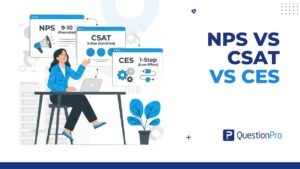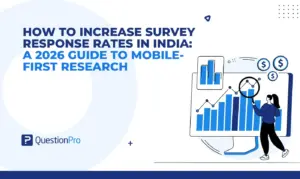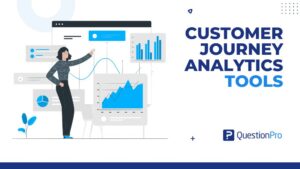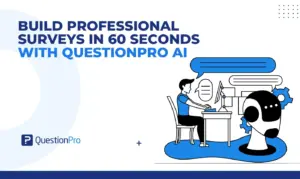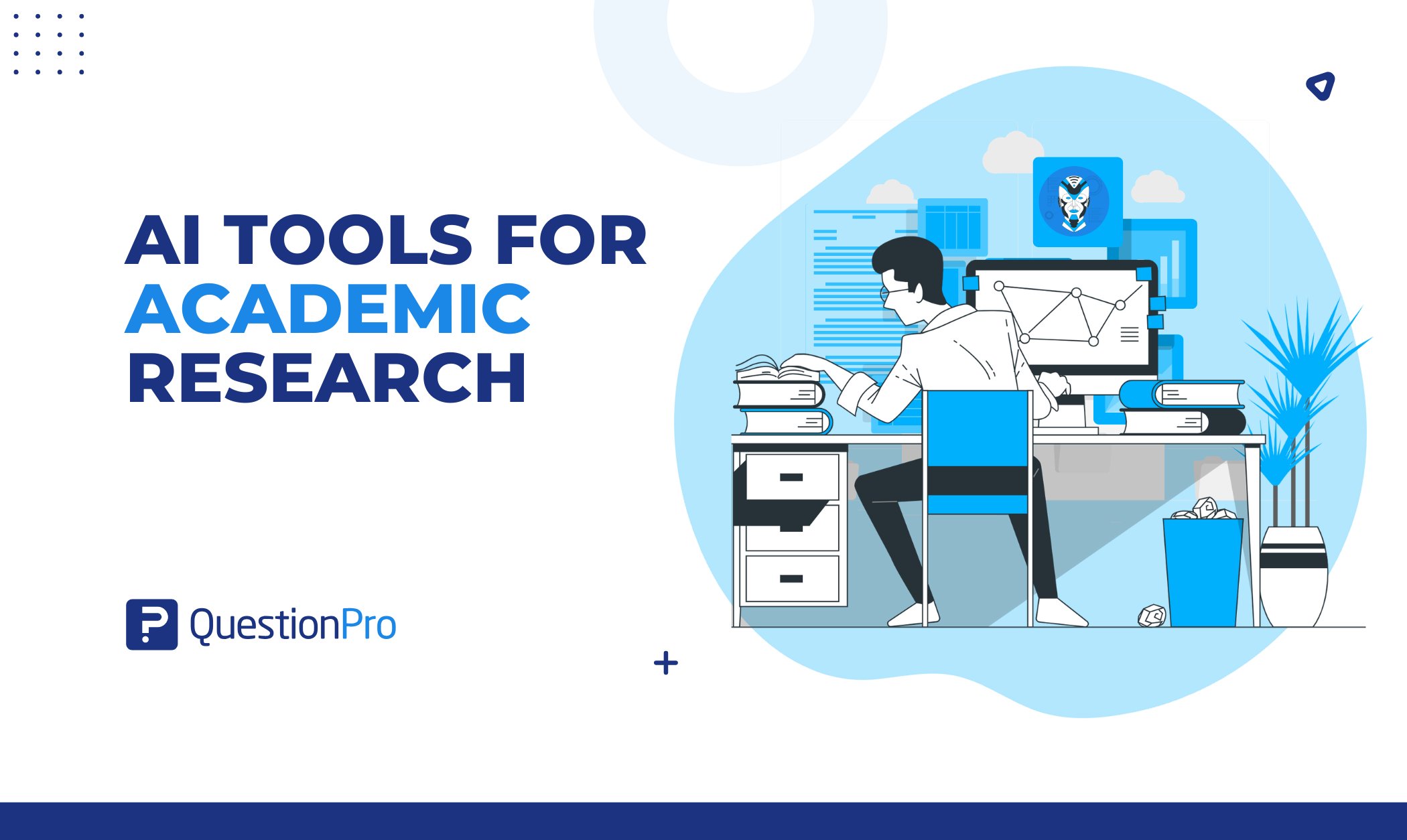
Imagine needing survey data from a rare demographic or facing ethical blocks with patient records. AI is changing that. It’s turning data scarcity into opportunity and replacing stacks of paperwork with smart automation.
Today, researchers have access to AI tools that can do everything from drafting papers with platforms like Gemini and Grok to simulating realistic survey responses using QuestionPro’s synthetic data. This isn’t just about saving time; it’s about reshaping how research gets done.
In this guide, we’ll walk through the different ways AI is being used in academic research, from writing helpers to synthetic data generators, and show how they can make research more accessible, ethical, and innovative.
What are the Uses of AI in Academic Research?
AI is transforming how scholars, especially PhD students, conduct their research. Tasks that once took weeks can now be done in hours, and the whole process feels a lot less overwhelming.
For academic writers, tools like GPT-4 can help with things like refining a hypothesis, summarizing complex papers, or making sure your work flows clearly from start to finish.
But AI isn’t just about making writing easier; it’s also about improving the depth and quality of research. For example, AI can:
- Identify patterns in unstructured data, such as interview transcripts or historical archives.
- Simulate experiments, such as generating synthetic patient data for clinical trials, to enhance understanding and inform decision-making.
- Check statistical strength to make sure your results hold up under scrutiny.
With AI-powered research platforms, PhD students can test ideas faster, uncover hidden biases in their methods, and see whether their findings are reproducible. The real benefit? AI takes care of the repetitive work so researchers can spend more time on the big, meaningful questions.
Tools like Elicit and Semantic Scholar use natural language processing (NLP) and smart search to scan millions of papers in seconds. They help surface relevant studies, point out gaps in knowledge, and even connect ideas across different disciplines.
In short, AI is no longer just a “nice-to-have” in academia; it’s becoming essential. By combining computing power with human curiosity, AI is not just speeding up research. It’s changing what’s possible.
Types of AI Tools for Academic Research
From drafting papers to simulating datasets, AI tools are reshaping every phase of academic research. Discover purpose-built solutions that accelerate workflows while upholding rigor and ethics.
Experiment & Survey Research AI Tools for Academic Research
AI-powered survey and experiment tools help design precise questions, optimize flow, and improve data quality. They save time while ensuring research meets rigorous academic standards.
1. QuestionPro AI
QuestionPro AI can help you to generate survey questions, suggest improvements, and optimize academic research designs.
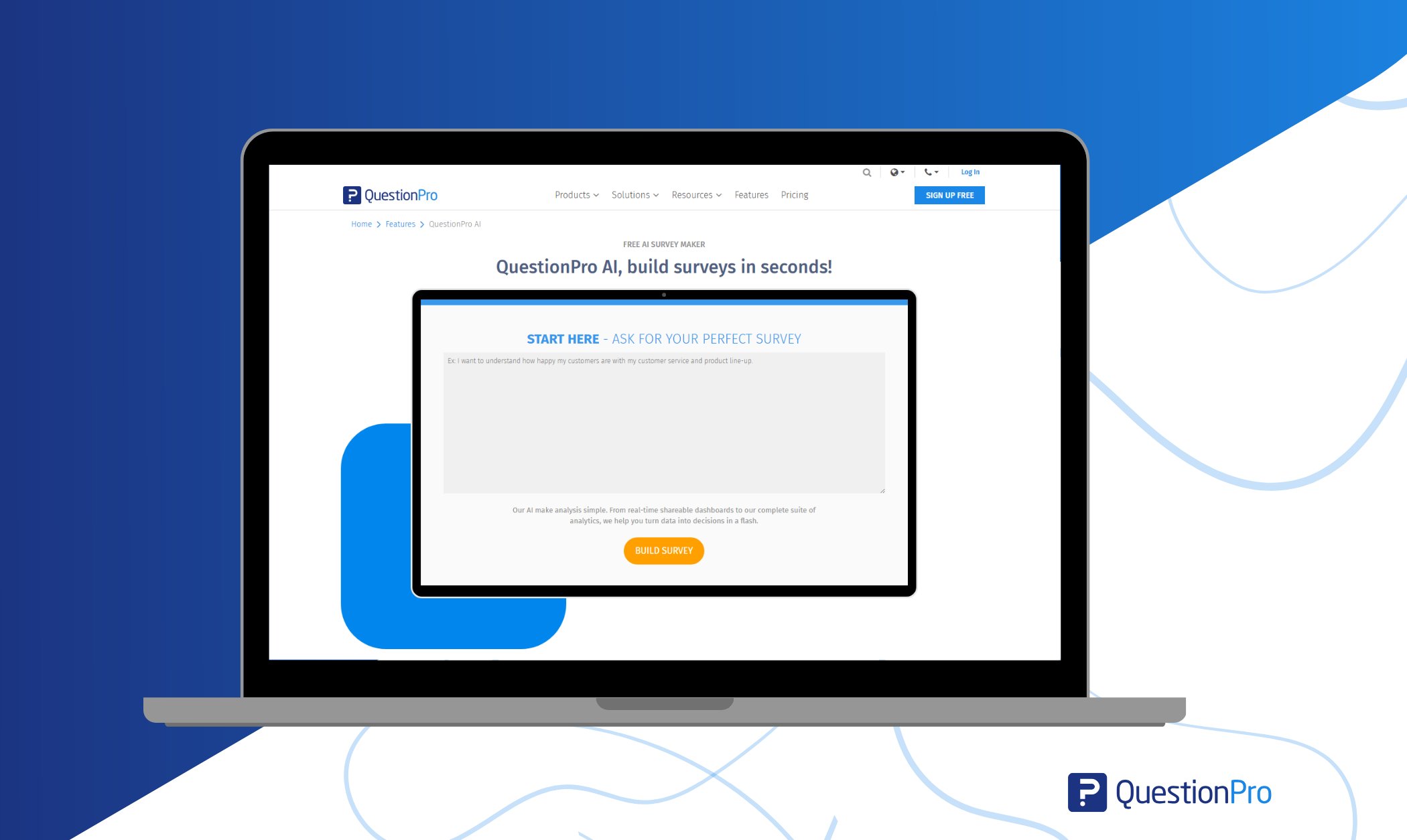
Features:
- AI-powered question generation
- 300+ academic and research templates
- Advanced logic and branching
- Real-time analytics dashboard
- GDPR/CCPA compliant
- Multi-language support
Limitations:
- No built-in qualitative interview transcription
2. Qualtrics XM
Qualtrics XM offers AI-assisted survey creation, predictive analysis, and automated data cleaning for academic research.
Features:
- Predictive analytics with AI
- Automated data quality checks
- Customizable survey workflows
- Multi-language support
Limitations:
- Higher pricing for advanced AI features
- Complex interface for beginners
3. SurveyMonkey Genius
SurveyMonkey Genius uses AI to recommend questions, predict completion time, and improve response quality.
Features:
- AI question suggestions
- Completion time prediction
- Survey performance scoring
- Mobile-friendly survey builder
Limitations:
- Limited advanced logic in the free plan
- Fewer customization options than competitors
- No integrated predictive analytics
Tools for Writing & Information Collection
AI writing assistants make drafting, editing, and clarifying academic text easier. They can also simplify complex ideas without losing scholarly accuracy.
1. ChatGPT
ChatGPT is a versatile text generator that helps with drafting manuscripts, editing, and simplifying complex ideas.

Features:
- Drafts/edits academic text
- Explains concepts in plain language
- Supports code generation
- Custom GPTs for research
- Mobile app support
Limitations:
- No built-in citation tools
- Generic academic tone
- Limited file upload analysis
2. DeepSeek
AI research assistant for analyzing papers, drafting reviews, and extracting insights from uploaded documents.
Features:
- Reads/analyzes PDFs
- Draft literature reviews
- Supports citations (APA/MLA)
- Free to use
Limitations:
- No real-time web search
- No collaborative editing
- Lacks multimodal input (images/audio)
3. Gemini (Google)
Gemini is an Integrated AI for hypothesis brainstorming, paper summaries, and Google Scholar synergy.
Features:
- Real-time web search
- Summarizes papers
- Integrates with Google Workspace
- Multimodal (text + image input)
Limitations:
- Requires a Google account
- Limited long-doc analysis
- Can hallucinate sources
- No dedicated academic templates
Literature Discovery & Analysis
These tools scan vast academic databases, summarize findings, and reveal research connections. They help identify gaps and organize sources efficiently.
1. Elicit
AI research assistant for finding papers, extracting methods/results, and summarizing findings.
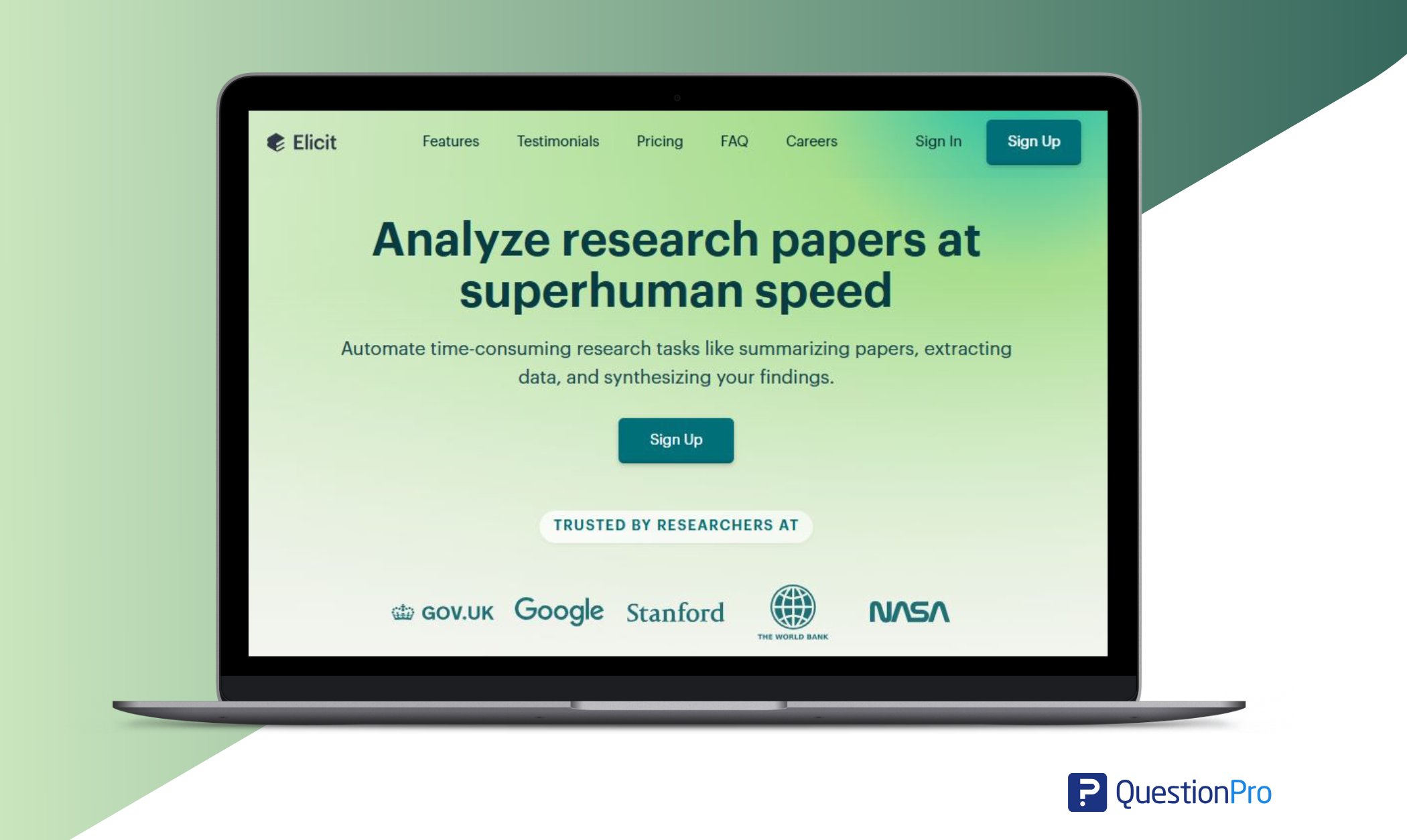
Features:
- Searches 200M+ papers
- Extracts key data from PDFs
- Identifies knowledge gaps
- Organizes literature matrix
Limitations:
- Limited to biomedical/social sciences
- Occasional extraction errors
- Basic filtering options
2. ResearchRabbit
ResearchRabbit, often described as the “Spotify for papers,” is a platform that helps researchers explore and visualize academic networks while discovering relevant studies tailored to their interests.
Features:
- Collaborative literature mapping
- Saves papers in collections
- Free with no paywalls
- Intuitive visual interface
Limitations:
- No PDF text extraction
- Limited to English papers
- Slow loading for large collections
- Mobile app unavailable
Data Analysis & Visualization AI Tools for Academic Research
AI analysis tools process data, detect patterns, and create clear visuals. They turn raw information into insights that researchers can easily communicate.
1. IBM Watson
IBM Watson is an NLP-powered tool that analyzes qualitative data, such as interviews and open-ended responses.
Features:
- Sentiment analysis
- Bias detection
- Customizable models
- Supports 13 languages
Limitations:
- Expensive for individuals
- Complex setup
- Requires training data
Peer Review & Quality Control
AI editing tools check grammar, tone, plagiarism, and journal compliance. They help ensure clarity, accuracy, and professionalism before submission.
1. Grammarly
It is a writing assistant that provides tone and clarity checks, along with grammar correction.

Features:
- Real-time editing
- Plagiarism detector
- Tone adjustment
- Browser/Word integration
Limitations:
- Weak in academic jargon
- No LaTeX support
- Limited free features
2. Paperpal
Academic-specific editor checking journal guidelines and technical language.
Features:
- Targets 2,500+ journal styles
- Technical language polish
- Grammar/readability scores
- AI rewrite suggestions
Limitations:
- Limited free checks
- Slow processing
- Ignores data/statistics
How to Use AI Tools for Academic Research
AI doesn’t mean cutting corners on quality. When you mix large language models, smart search tools, and powerful analytics, you can turn your curiosity into solid, well-supported insights faster and more efficiently than ever before.
Step 1: Refine Your Question
Before diving into literature searches or data collection, clearly define what you want to achieve with your research. AI tools can help you transform broad ideas into precise, testable objectives.
For instance, if your initial topic is “climate migration in Southeast Asia”, you can use a large language model like ChatGPT or Gemini to:
- Break the topic into specific sub-topics (like “How does flooding frequency impact rural-to-urban migration rates in Vietnam?”)
- Identify measurable variables and relevant timeframes.
- Suggest suitable research methods, such as surveys, case studies, or statistical modeling.
This step ensures that your research has a clear focus, making every subsequent stage from literature review to data analysis more targeted and effective.
Step 2: Find Literature & Evidence
Deploy AI search engines (like Consensus and Elicit). Paste your question into these tools:
- Scan millions of papers in seconds,
- Uncover contradictory evidence or emerging consensus,
- Prioritize high-impact papers from top universities.
Step 3: Analyze Papers & Extract Answers
Upload PDFs to tools like DeepSeek or Scite. AI will:
- Summarize methods/findings,
- Extract precise answers (like “List all studies linking X to Y”),
- Highlight data conflicts or citations needing verification.
Step 4: Design Research Instruments & Synthesize Insights
If your project requires collecting original data, AI-powered platforms like QuestionPro AI can streamline survey design and even simulate synthetic datasets to test your approach before going live.
This allows you to identify potential gaps, ensure your questionnaire captures the right variables, and validate your analysis plan without compromising privacy.
For example, imagine you’re studying remote learning satisfaction among university students. With QuestionPro AI, you could:
- Input your research goal (“Measure student satisfaction with online classes”)
- Receive a set of validated, well-phrased survey questions
- Run a synthetic data simulation to see how responses might trend across demographics
- Add advanced logic to customize follow-up questions based on simulated or real responses
- Instantly preview analytics to ensure your survey will yield actionable, comparable results
Once your actual responses are collected, large language models can help you compare perspectives or draft narratives, for instance, “Contrast findings from students in urban universities with those in rural institutions”.
Step 5: Maintain Scholarly Integrity
AI speeds up but doesn’t replace critical thinking. Always:
- Trace AI-generated claims back to sources.
- Disclose AI usage in methods.
- Use plagiarism/AI detectors pre-submission.
From framing questions to synthesizing evidence, AI tools make world-class research practices accessible to all.
Tips for Using AI Tools for Academic Research
AI tools can make research faster and easier, but they still need to be used wisely. To get the most out of them while keeping your work accurate, ethical, and credible, it’s worth following a few best practices. Here are some practical tips for using AI tools during academic research:
- Cross-check AI-generated answers with primary sources. Never accept outputs unquestioningly.
- Follow your university or journal’s AI policy.
- Pilot synthetic data before full deployment.
- Never upload confidential data (patient records, surveys) to public AI tools.
- Rewrite AI drafts in your voice. Don’t parrot AI answers.
- Check synthetic data for demographic skews.
- Update prompts as tools evolve.
The key is finding the right balance. Let AI take care of the repetitive, time-consuming stuff, but keep the big-picture thinking, ethics, and interpretation in your hands. The future of research isn’t about humans competing with AI; it’s about humans working with machines.
Conclusion
AI tools for research aren’t just a nice extra; they’re transforming the way we discover, analyze, and share knowledge. In this post, we’ll look at some of the best AI tools for research and how you can use them to make your papers stronger.
Whether it’s speeding up a literature review or creating ethical synthetic datasets, platforms like QuestionPro give researchers new ways to explore ideas without losing academic integrity. As research becomes more data-heavy and crosses into more disciplines, using AI responsibly helps keep it innovative, inclusive, and impactful.
The real magic happens when you combine the right tools with your own critical thinking and transparency. That’s how you boost accuracy, work faster, and make meaningful contributions, proving that the future of research isn’t about replacing human insight, but enhancing it with intelligent systems.
Frequently Asked Questions (FAQs)
Answer: Tools like ChatGPT and Gemini assist in drafting, editing, and simplifying academic texts. They can generate literature reviews, suggest research questions, and polish grammar and clarity, though human oversight remains essential.
Answer: Yes. Platforms like QuestionPro, Gretel.ai, and SDV generate synthetic data that mimics real datasets, making them useful for simulations, ethical testing, and data-limited scenarios.
Answer: Tools like Elicit, Semantic Scholar, and ResearchRabbit help find, summarize, and organize academic papers, surfacing relevant studies and identifying research gaps.
Answer: Yes, but usage should be disclosed according to your university or journal’s AI policy. AI should support, not replace, original research and critical thinking.
Answer: QuestionPro utilizes AI to simulate human responses for surveys, enabling researchers to refine survey design, ensure data quality, and derive behavioral insights while remaining GDPR/CCPA compliant.
Answer: No. AI enhances research by automating repetitive tasks and suggesting insights, but human intuition, ethical judgment, and domain expertise are irreplaceable.




